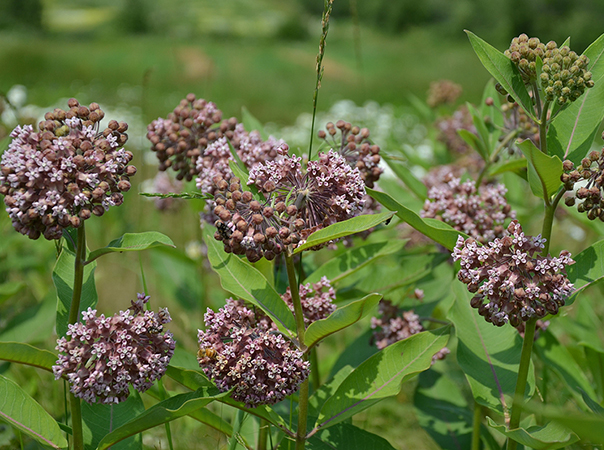
Ghyslain Bouchard and Laura Hamel, from the Canadian textile manufacturing company Vegeto, talk to Jessica Owen about the company’s milkweed-based insulation.
Materialising concepts is one of the biggest challenges facing successful sustainable textile innovation. While nature provides the industry with an abundance of inspiration, turning those ideas into cost-effective and scalable products requires a great deal of effort.
One company that knows this journey well is the Canadian textile manufacturer Vegeto. Founded in 2010, the team has spent the last 12 years developing a milkweed-based high-performance insulation and adjacent supply chain, which it launched in January 2022.
Laura Hamel, communications advisor at Vegeto, says: “Milkweed is an indigenous plant in Canada. Though it’s not widely harvested, it’s common and is often seen growing alongside roads.”
She adds: “The plant has hollow fibres, which means they retain air well and therefore maintain temperature. It was this property that motivated the project.”
Vegeto’s general manager Ghyslain Bouchard – a textile industry veteran of 40 years – actually started on this journey in the late 1990s. The federal government asked him to be part of project to utilise the milkweed fibre, however the project was short-lived when the team realised the complexity of the task.
Fast forward to 2010 and Bouchard decided to try again because “milkweed fibre is too good not to use.” He formed a co-operative in Canada to bring farmers and textile experts together and has now built a field-to-fibre in-house system capable of producing milkweed-based thermal insulation.
As is the case with other natural fibres such as cotton, Vegeto’s supply starts with the farmers. The team liaises with a network of farmers to understand factors such as yield, price and quality of harvest.
Hamel says: “We work hand-in-hand with the growers to make sure growing milkweed is profitable enough for them, while making sure the harvest is good enough for producing textile fibres.”
Once the milkweed pods have been harvested, they are sent to Vegeto to begin processing. Using nonwovens machinery, the fibres are opened and blended before being made into a web, which is then consolidated to make fabric rolls.
Hamel continues: “Our manufacturing process is our secret sauce. The fibres are handled delicately so that they don’t lose their integrity and are kept long enough as this ensures the best quality.”
Bouchard adds that the process has taken a long time to perfect. He says the team concluded that the nonwoven process would be the only one that would produce a satisfactory product, but the nonwoven machinery manufacturers were not convinced at first.
He says: “We spoke to a lot of machinery manufacturers – we went to Italy, Germany, Switzerland – but when I told them what I wanted they said: ‘Are you serious? It can’t be done.’
“Eventually, with our team’s combined experience, we decided to design and modify existing equipment so that we could produce our milkweed product.”
Today, Vegeto’s thermal insulation comprises 25% milkweed, 25% kapok and 50% corn starch biopolymer, says Bouchard. A 100% milkweed insulation is not yet possible because of the limited supply of the crop and because the final fabric would be harder to handle. Therefore, the kapok – a fibre with similar characteristics to milkweed – bolsters the natural fibre content and the corn starch biopolymer helps to bind the mixture together.
Bouchard and Hamel say that different compositions are possible but the 25:25:50 ratio performs the best. Standardising this recipe also helps to maintain the product’s reputation across all applications, and it means the team doesn’t have to spend time adjusting the machinery settings.
The team says that it’s milkweed-based thermal insulation is suitable for mild spring weather as well as winter’s frigid temperatures. In fact, testing conducted at an independent laboratory (CTT Group) confirms the product’s thermal insulation properties: the CLO value ranges from 2.5 to 4.5, depending on the weight of the chosen product (100 g/sqm, 150 g/sqm, 200 g/sqm and 250 g/sqm).
What’s more, the insulation can be washed similar to synthetic insulation or down products and is considered a drop-in alternative to other insulation on the market.
One factor that does differ to synthetic alternatives is the price, says Bouchard. Vegeto’s product is more expensive than petroleum-derived materials, though is it cheaper than using goose down, for example.
Hamel explains: “The price is a deal breaker for most brands.”
Bouchard adds: “Some people are willing to pay for sustainability but others are not. And I’m not going to bring the price of my quality product down for them. In my opinion, the impact to the planet is worth a lot more than the bill.”
Besides being a natural fibre, milkweed is a perennial plant that requires little water to grow (unlike cotton). It can grow on relatively baron land, doesn’t need pesticides due to an inherent defence system and even supports Monarch butterflies, according to Hamel.
Although the insulation only launched on 18 January 2022, the team says it is already working with brands to develop products such as jackets, sleeping bags and mittens. Because it’s a new concept, Hamel says there is a lot education required but the company is willing to provide design and construction guidance.
The first two brands that Vegeto is working with are based in Quebec. Hamel says the insulation has received a wave of interest for domestic production – a trend likely influenced by the Covid-19 pandemic.
She says: “I think these brands like that they can make a sustainable choice without having to import it. Especially considering the current cost of shipping and long delays.”
Vegeto has had its fair share of long delays, but Bouchard says 2022 will be the year that this common roadside plant becomes a high-performance thermal insulation to be reckoned with.
To find out more, visit www.vegetotextiles.com
Have your say. Tweet and follow us @WTiNcomment








